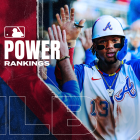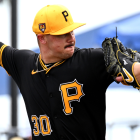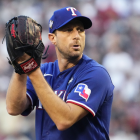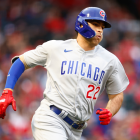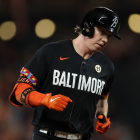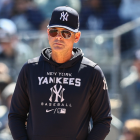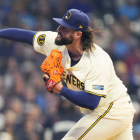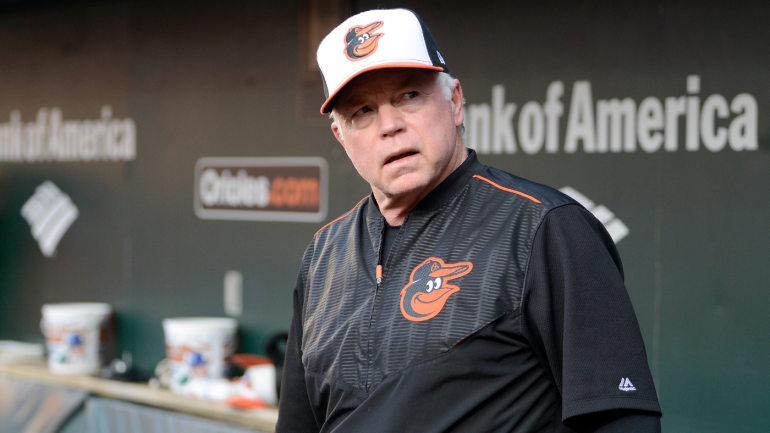
The New York Mets announced on Saturday they had hired Buck Showalter as their manager. Showalter had previously been reported as one of three finalists for the position alongside a pair of bench coaches, in Houston's Joe Espada and Tampa Bay's Matt Quatraro. He's the fourth individual to be named Mets skipper since the 2018 season began, joining Mickey Callaway, Carlos Beltrán, and Luis Rojas. (Beltrán was fired shortly after he was hired as part of the Astros' sign-stealing scandal fallout.)
Showalter is a departure from those previous hires in one notable way: he's a proven hand. In parts of 20 seasons at the helm, he's won more than 1,500 games and has led three of his four clubs to the postseason a combined five times. He has also developed a reputation for being a turnaround artist: his teams have, on average, won 22 more games in his second full season than they did in their first. Some of that can be credited toward regression, but some of it is likely attributable to Showalter's details-oriented methodology; after all, he was even involved in laying out the stadium during his time as manager of the then-expansion Arizona Diamondbacks.
The Mets are hoping that Showalter can work similar magic in New York, albeit on a shorter timeline. The Mets haven't made the postseason since 2016, when they lost the National League Wild Card Game to the San Francisco Giants, and yet they're slated to shatter the franchise record for payroll for a second consecutive year. Another disappointing season like last, when they lost 85 games, would be hard to stomach, and would represent an abject failure after an offseason that has seen them sign star-caliber players like Max Scherzer and Starling Marte, among others.
What developments will dictate how Showalter fares with the Mets? Below, we've laid out four pressing matters in the form of questions that will determine just that.
1. How much can he get from deGrom, Scherzer?
Our Matt Snyder recently ranked the Mets' combination of Jacob deGrom and Scherzer as the top 1-2 rotation punch in all of baseball. An easy way for a manager to appear smart is to start legitimate Cy Young Award candidates two out of every five games, the way Showalter would be able to if deGrom and Scherzer are hearty and hale.
The catch is that neither is guaranteed to be healthy -- and we don't mean that in a nihilistic, "all pitchers get hurt" sense. Both deGrom and Scherzer had physical issues that compromised their years: deGrom was limited to 15 starts because of various woes, including a "low-grade" sprain of his ulnar collateral ligament (the Tommy John ligament); Scherzer started 30 regular-season contests before his postseason was disrupted by arm fatigue. Both deGrom and Scherzer have been workhorses throughout their careers, yet last season proved the past doesn't assure the future.
The Mets know this as well as anyone. They've finished in the top third of the majors in days to injury in three of the last four years, according to Spotrac. Keeping deGrom and Scherzer on the mound rather than on the mend is easier said than done, and ultimately Showalter can do only so much to impact the outcome. He can be mindful of workloads and pitch counts; he can shuffle the rotation to get them an extra day of rest here and there; and so on. Even with improved technology and understanding of how bodies work and what makes them break, there's still a large element of luck involved when it comes to injury prevention.
Alas, the Mets' chances of making a serious run, either at the division or at the pennant, will hinge on them getting as much as they can from deGrom and Scherzer. Any misstep on Showalter's part, be it perceived or actual, will be second guessed.
2. How does he handle Canó's return?
One storyline worth monitoring in the early stages of Showalter's tenure is how he deals with second baseman Robinson Canó, who did not play last season while he served a suspension for a failed performance-enhancing drug test.
The last time we saw Canó, he hit .316/.352/.544 (143 OPS+) in 49 games in 2020, suggesting he remained a capable hitter during the COVID era. It's reasonable to wonder how much (if any) the substance he was caught using helped; it's also reasonable to wonder how much the year off will hurt a player in their late 30s.
Showalter's deployment of Canó, then, will be interesting, from how he talks about him in spring training (will the second-base job be given to Canó, or will it be a competition) to how he reacts if Canó starts the season in a slump. Obviously there are greater forces at play than Showalter's opinion on these matters -- including Cohen's willingness to eat what remains on Canó's contract -- but Canó's situation will be interesting to watch unfold.
3. How will he manage Cohen's tweets?
We're joking, mostly. Showalter worked for George Steinbrenner, for Pete's sake, so he should be steeled against Cohen's tendency to express himself on social media. Still, it seems probable that Showalter is asked about a Cohen tweet at some point, and that's going to be a decidedly new experience for a manager who has seen and handled almost every situation a manager can during his two decades at the helm.
4. What else will the Mets do this winter?
Let us not forget that the offseason isn't over. Once the owner-imposed lockout is lifted, after the ratification of a new Collective Bargaining Agreement by both the league and the MLB Players Association, there will need to be a buffer period before the season begins during which resolutions can be reached on remaining loose ends -- of the free-agent variety, yes, but also on the slow-moving trade front. The Mets figure to be active in both arenas, likely with an eye on beefing up their pitching staff.
Prior to the lockout going into effect, New York was rumored to be interested in free-agent southpaw Yusei Kikuchi. It stands to reason the Mets will add a reliever or two before the season begins, too, lest they enter the year with Jake Reed and Sean Reid-Foley guaranteed roster spots. The Mets could also look to move Jeff McNeil, Dominic Smith, or J.D. Davis now that Canha and Escobar are in tow.
Granted, the Mets probably won't make the kind of headline-grabbing moves they did during the winter's first half. But, as Showalter's career shows, there's value to be gleaned from getting the finer details right. We'll see if the Mets can do just that.














